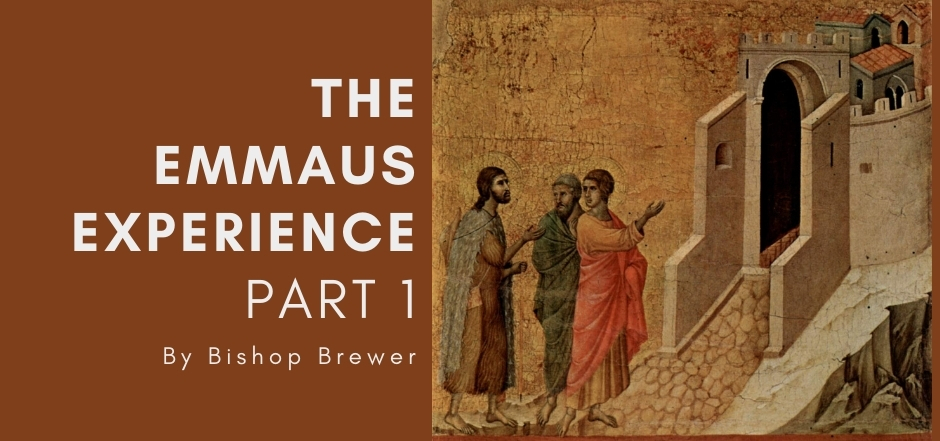The Emmaus Experience – Part 1
In Luke 24:13-35, we are invited to walk with the two who were making their way home to Emmaus from Jerusalem. When we enter the scene, according to the Gospel of Luke the two are walking together and, in the anonymity of a country road, talking freely.
Processing Their Grief
In some ways, the language we would use is “they are processing their grief.” The one whom they hoped would literally turn everything around, the one who had already changed their lives profoundly, even irrevocably, was gone. And at that point, there was no hope of any Resurrection. At least not that they could remember.
Grief does things to you. It makes your body feel heavy; it causes you not to think clearly. Concise thought, much less memory, is not a part of what you experience. And so, as they’re talking along the road, they’re in essence trying to get the heaviness out and put it in front of them rather than bearing it privately within them. And they’re so lost in that world of shared grief and conversation, they don’t even notice Jesus coming up, walking behind them and finally getting abreast of them.
So, as they are talking, Jesus actually has to break in and say, “What are you talking about?”
And they look at him like he’s a visitor from another planet. “Are you the only one that did not know?” (And they tell the story of what it is that they know, but it is a story shaped by their own sense of loss. “We had hoped that he would be the one to come in and redeem Israel.”
You can hear the pathos of hope denied, and much more in a very telling comment. In describing the women who told them about the angels who said Jesus was alive, the Greek literally says, “They drove us out of our senses” (see Luke 24:22a).
You see what kind of world you live in when in the midst of your own deep heaviness and internal grief, someone comes and says, in essence, “It’s not over.” How do you even process the story of a man being raised from the dead? Of course, they would dismiss it. There’s nothing that in their experience that would have even begun to have prepared them.
Recognizing Their Savior
And so initially, Jesus listens. He’s gentle, and the scripture even says his followers’ eyes were kept from seeing who he was (see Luke 24:16). There’s nothing in them that would ever have been prepared in that moment for a revelation of resurrection.
So Jesus at that point is, in fact, their companion. A stranger, traveling on the road. He’s listening to their stories. But this stranger is paying very close attention to what they are saying. And finally, when the air has been cleared, Jesus speaks.
His response is interesting because it’s actually at the beginning a rebuke, not what you would have expected if Jesus had been a therapeutic counselor listening to a grief story. But he feels the need to break in. You see, Jesus does that sometimes, when our thoughts are so completely centered in our own experience that we cannot see anything else but what we are feeling in the moment. Jesus breaks in to show us a wider world, something much bigger than the internal cycle of replaying grief and loss, and what we hope might have been but no longer can be.
And so, he uses strong words: “Slow of heart to believe,” “foolish,” words to get their attention that in essence, are almost like a caffeine injection into their lethargy. “What? Who is this to speak to us in that manner?”
But Jesus doesn’t stop there. He keeps going. And I would have loved, as you would too, to have heard this conversation. How does the Messiah teach them what the Scriptures say about him?
But that’s what he began to do. He began to explain to them out of the Scripture, which of course for them would have been the Old Testament, how each of the things that had happened to him had been prophesied thousands of years before. And something begins to happen inside them as they listen to the things he is saying. They would later say, “Were not our hearts burning within us while he was talking to us on the road, while he was opening the scriptures to us?” (Luke 24:32b).
We’ll read more about how these early Christ-followers responded to their risen Lord in my next post.
What do your own responses have in common with these from those on the Emmaus road? Share this blog and your response on Twitter. Please include my username, @revgregbrewer.
(This post is an adaption of Bishop Brewer’s sermon recorded for April 26, 2020, in the Bishop’s Oratory of the Diocesan Office, Orlando.)
Unless otherwise noted, Scripture quotations are from the New Revised Standard Version Bible, copyright © 1989 the Division of Christian Education of the National Council of the Churches of Christ in the United States of America. Used by permission. All rights reserved.

